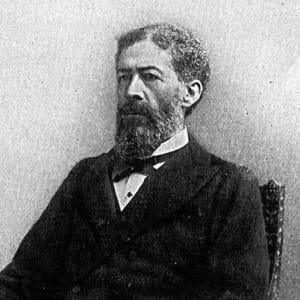NSU Newsroom
SharkBytes
Horizons
This version of NSU News has been archived as of February 28, 2019. To search through archived articles, visit nova.edu/search. To access the new version of NSU News, visit news.nova.edu.
This version of SharkBytes has been archived as of February 28, 2019. To search through archived articles, visit nova.edu/search. To access the new version of SharkBytes, visit sharkbytes.nova.edu.
Black History Fact 2019: John Mercer Langston-The First African-American to be Elected to Public Office in the United States.
Source: BIOGRAPHY
Synopsis
John Mercer Langston was born on December 14, 1829, in Louisa County, Virginia. In 1854, Langston became the first African-American lawyer in Ohio. In 1888, he became the first African American to win a congressional election in the state of Virginia, having run as a Republican candidate for a seat in the U.S. House of Representatives. Langston served in Congress from 1890 to 1891. He died in Washington, D.C., in 1897.
Early Life and Education
John Mercer Langston was born in Louisa County, Virginia, on December 14, 1829, the fourth child of a white slaveholder father and an emancipated slave mother. Both parents died when he was a child, and Langston received a large inheritance.
After living briefly with a family friend in Chillicothe, Ohio, Langston moved to Cincinnati, where he became focused on establishing civil rights for black citizens. He attended Oberlin College, and got involved in debate. After completing his undergraduate degree, Langston continued his studies at Oberlin, earning a master’s degree in theology. He was not accepted into law school, however. Determined, Langston studied privately in Elyria, Ohio, and passed the bar exam in 1854—becoming the first African-American lawyer in the state of Ohio.
Law Career
Langston established a law practice in Brownhelm, Ohio, where he was also elected town clerk in 1854—making him the first African American to hold elected office within the United States. In 1856, Langston relocated to Oberlin and worked as a city councilman from 1865 to 1867. The following year, he became a member of the Oberlin Board of Education.
Civil War Efforts
During his early career, Langston assisted many runaway slaves along Ohio’s Underground Railroad and founded anti-slavery societies. As the Civil War began, he helped recruit and assemble Union troops, including the first black regiment in the nation, the Massachusetts 54th.
Named leader of the National Equal Rights League in 1864, Langston committed himself to suffrage after the war. Three years after the war ended, in 1870, black males received the right to vote.
Community Leader
Langston became involved with Howard University, an African-American institution, setting up the school’s law department in 1868 and later serving as acting president. He ran for the university’s presidency in 1875, but was removed from running due to his race.
In 1877, President Rutherford B. Hayes appointed Langston U.S. minister to Haiti, a position that he would hold for the next seven years. In 1885, Langston was elected president of the Virginia Normal and Collegiate Institute.
Congressional Service
In 1888, Langston won a seat in the U.S. House of Representatives, becoming the first African American to win a congressional election in the state of Virginia. The race caused bitter division between both racial and party lines. Fearing division of the Republican Party, Frederick Douglass fiercely opposed Langston’s candidacy. Though his seat was contested for nearly two years, Langston served in Congress from September 23, 1890, to March 3, 1891.
Langston married fellow Oberlin student and abolitionist Caroline Wall in 1854. The couple had five children.
On November 15, 1897, three years after his retirement, Langston died in Washington, D.C.
